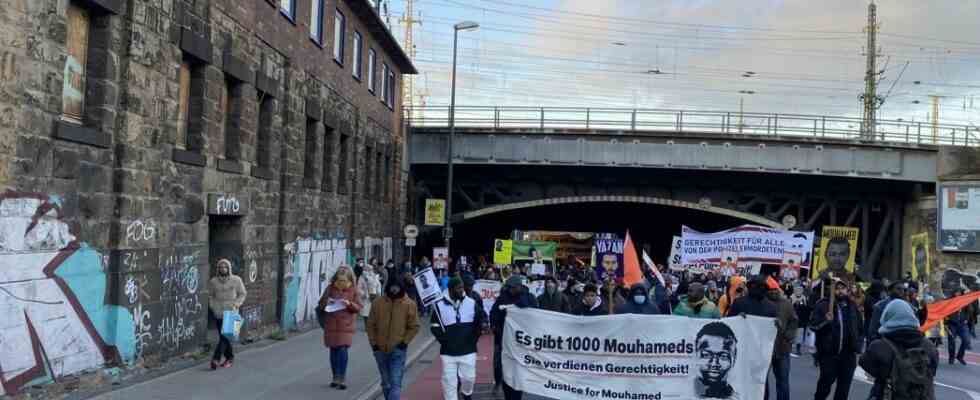Justine Seewald-Krieger has now been on the road for almost three hours. The blond woman usually marched away in front, repeatedly lifting the red poster: “Justice for Sammy” is written there, and beneath it you can see the smiling face of Samuel, her dead son. Seewald has been demanding justice for more than two years. In August 2020, Dutch police officers shot her son, who was apparently completely confused at the time, in a backyard in Amsterdam.
Now, just before the end of the demonstration through the north of Dortmund, Seewald’s eyes look tired. But that is deceptive: “The fact that so many people are taking to the streets with us today is confirmation for me,” she says. She took courage and made new contacts with other people who are fighting back against police violence and the alleged arbitrariness of investigative authorities. “My lesson from today is: we don’t stop!”
Anger, rage, sadness – the mood is turbulent when the demonstration marches leave the square in front of Dortmund’s main train station early on Saturday afternoon. The reason for the protest is another case: Exactly 103 days ago, Mouhamed Dramé, a 16-year-old refugee from Senegal, died in Dortmund. The boy had crouched distraught against a wall in a courtyard in Nordstadt, could not be spoken to, and threatened himself with a knife. Then the police came with twelve officers, scared Mouhamed Dramé with pepper spray – and after everything that has since leaked out from the investigations of the public prosecutor’s office about that late afternoon of August 8, 2022, the officers suddenly felt threatened, shot two Tasers and finally one submachine gun. Mouhamed Dramé died after being hit by four bullets from a police gun.
“Mouhamed has many faces, Mouhamed has many names,” boomed the loudspeaker truck. For example Sammy. Or Amed, Dominique or Ousman. Dozens of demonstrators carry small placards with black-and-white photos of other dead people, all of whom they believe have been victims of police abuse and violence. And they mainly affect black people and people of colour. “Racist,” a woman calls into the megaphone, is this police force that “simply kills people who don’t fit into their white worldview.”
Twenty or thirty other participants just hold up posters with the same word over and over again: “Individual case” is written on it – the word official regret, which sounds like mockery in the ears of the demonstrators when another deployment ends in tragedy. Lena Oberbaumer wears such a sign, and the teacher from Bielefeld is firmly convinced that there is structural racism in the police force: “Why else are my friends and acquaintances constantly checked – and I, as a white woman, never?”
The Dortmunder Nordwache has a bad reputation among non-white people
The police estimate that at least 1,000 people have gathered in Dortmund. There are probably even more than 2000 people. It gets heated when the protest march arrives on Münsterstrasse in front of the north police station. “Listen to our anger, this is the anger of grief,” calls William Dountio into the microphone. Fourteen police officers in dark blue uniforms are standing in front of the station, holding their white helmets in their hands. They stare into space, unmoved, as some demonstrators chant that the officers have “blood, blood, blood” on their hands. They also look unmoved when Dountio adds that there is “no anger of hatred.”
The Dortmunder Nordwache is discredited by many non-white people in the district. Ten or twelve-year-old boys are afraid of the police, says Dountio. Dountio is a co-organizer of the protest. The Cameroonian has been in regular contact with Mouhamed Dramé’s family in Senegal for three months. He sends Dramé’s older brother Sidy live messages or videos from the demo via Whatsapp: “The family is grateful for this sign of solidarity,” says Dountio.
In front of the north guard, a woman in a red coat shouts a few sentences to the police officers. For example, that blacks and whites “breathe the same air,” or this: “We blacks are not animals.” She would rather not reveal her name, and no, “never!” If she were to call the police for help in the event of a robbery in Nordstadt, the woman says, pointing to her dark complexion: “They’ll immediately think I’m the perpetrator.” Then the native South African (“I grew up under apartheid”) turns back to the police officers: “You have to know: We will stay in Germany and in Dortmund!” Because she found her love here, ten years ago – a German. A police officer smiles at her as she says this, and she’s still smiling as the woman yells across the barrier, “You have to change!”

